




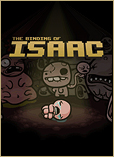

|
The Binding of Isaac
Edmund McMillen & Florian Himsl, PC/Mac/Linux
If we were handing out awards for Most Played Game of the Year, Binding of Isaac would have no competition on my list. Steam clocks me at 132 hours. Even after discounting more than a few nights of idling (death is permanent, and there is no save game functionality), it eclipses my current playtime on Skyrim, widely accepted as 2011's timesink of the year.
It's hard to determine just why this brutal Zelda-meets-roguelike, by Edmund McMillen and Florian Himsl with music by Danny Baranowsky, consumed me so deeply. Its premise, essentially an allegory about child abuse by way of the titular Old Testament story, is heavy handed, but such explorations are nearly unheard of in commercially successful video games, which gives the game an uncommon vitality. Character progression, which consists of dozens of different attributes accrued by Isaac over the course of the game, is extraordinarily random and can lead to playthroughs that seem doomed from square one--which only makes all the more satisfying those runs in which Isaac quickly evolves into a flying death-dealing spectre. The game can't even be fully completed until the player has completed nearly a dozen successful playthroughs, as additional levels and bosses become progressively unlocked.
Essentially, there's not much about The Binding of Isaac that one would assume would make a successful, well-received game. And that's a big part of why it's so wonderful.
Chris Remo
This game sure has a lot of poop and piss and aborted babies in it. Which, for a Roguelike game that encourages you to play and replay and replay again, can get pretty tiresome. At least in concept it's legitimately interesting at first, but once you get past the shock of the new that comes with such an unheard-of premise, it becomes kind of really dumb and distracting. All things considered, the current crusting of filth more than anything serves to obscure the potential longevity of this utterly brilliant game design.
Steve Gaynor
|


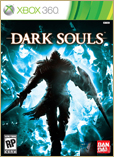

|
Dark Souls
From Software, Xbox 360/PlayStation 3
As a video game player, it's nice to be reminded every once in a while that you're not a goddamn idiot.
Which isn't to say that there aren't plenty of games that expect you to think like an adult human with a brain. Some even came out this year--SpaceChem, Atom Zombie Smasher, English Country Tune, and probably a bunch of hex-based wargames and submarine sims Nick plays.
But as a player of more mainstream fare in which you control a Dude and kill tons of enemies, it's not hard to get the feeling game designers think you're a bit developmentally disabled. Maybe you've had minor head trauma, or are watching YouTube while you play. Because they sure aren't expecting you to be using 100% of a capable adult's mental capacity to overcome what they've designed.
Press thumbstick in direction of goal arrow. Press button to jump over gap. Jam button to complete quicktime event and win cutscene. It's not a question of skill, understanding, or deduction; it's a willingness to go through the motions until the credits roll.
There's definitely nothing deterministic about From Software's Dark Souls. There is no guarantee you will see the end credits, that's for damn sure. I haven't. And I loved the game. In the end, it wore me out. It won. I got to that sequence in Anor Londo with the two guys throwing lances (the one Justin McElroy sang a musical tribute to) and I had the idea of what to do, but I just wasn't up to it. My character died and stayed dead. The end.
And that's why I loved the game so much--it had high expectations of me, and I worked hard to fulfill them for a long time. When the first Black Knight in Undead Burg one-shotted me I came back, played defense, and wore him down bit by bit instead of rushing in headlong. When I repeatedly died to the Drake's flames on the bridge? I slowed down, observed, and found an alcove to duck into between blasts. When I fell in a hole and got cursed by those godawful frogs? I went on an epic fucking odyssey to restore the 50% max health I'd lost.
All this because the game demanded something of me, and I appreciated what it demanded: not twitch reflexes, a willingness to grind, nor the money to pay in for top-tier "freemium" items, but the more fundamental qualities of patience, observation, and dedication. It doesn't bother me that in the end I didn't have enough of those to see it through, because it shows I really was challenging myself to accomplish something I wasn't guaranteed to achieve. Unlike so many games, Dark Souls is a mountain not just anyone can climb.
Steve Gaynor
|


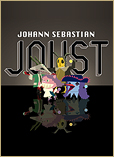

|
Johann Sebastian Joust
Die Gute Fabrik, PC/Mac
Johann Sebastian Joust is not a video game. There is no video portion of the game. Its visual aspects exist entirely in the real world.
Joust is a motion game developed by Die Gute Fabrik of Denmark. You and up to six friends clutch Playstation Move controllers, which become fickle acceleration-sensitive batons whose paths are tracked by your computer. The goal is to protect your controller from any sudden jolts, while trying to induce such movements in your opponents. What results is a magnificent and chaotic collaborative and competitive dance of strategy, strength, and sneakiness.
The pace and energy of the game causes the hours to scream by. I don't know what is more perplexing: figuring out where the time went, or figuring out how, in the day of Motion Everything, it took a brilliant indie and the co-opting of a Sony device to nail every single aspect of what makes a party game a must-own. This is your PlayStation Move motion control GOTY. And it's on your PC.
Sean Vanaman
|


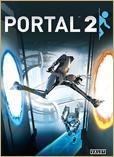

|
Portal 2
Valve Software, PC/Mac/Xbox 360/PlayStation 3
Making the jump from "What is Portal?" to "What is a Portal game?" is huge, because there are so many places one could go. When your starting point is a single point, a single game, floating alone in the void with nothing to indicate a trajectory--that's daunting, and probably explains why so many AAA sequels feel like they take the safest route. Planting a second point out in space and connecting the two forms a line, a vision, a statement. Better bunch up as close as possible to the only other thing out there, lest someone think you're not where you're supposed to be.
Fans expected more test chambers, and they got a trip through the 1960s and '70s. They expected more GLaDOS, and they got a depressed potato clock. They wanted answers to the big questions of the universe, and were shown a forgotten shelf filled with second place trophies. The Portal Gun doesn't do anything new, but there are these huge tubes of gel everywhere for you to play with. Valve went out of its way to meet people's expectations of what a Portal sequel would be, but never met them head on. Portal 2 is a textbook example of how to give your audience what they want without giving them exactly what they asked for. It's a show of confidence you rarely see, and that confidence is worth commending.
The one place that confidence falters is in its audience's ability to actually play it. Portal was a game of rough edges, but that was part of its charm and to a degree, its success. When you found yourself spiraling off a 15-floor drop only to catch yourself on a tiny ledge at the last second, place a portal on a previously-unnoticed surface between two tightly-wedged barriers and slip past a chunk of the level, you wondered just who you were outsmarting: GLaDOS, or Valve itself. With Portal 2 there is almost never that ambiguity.
The most thrilling moment of the first game was discovering you weren't alone, by finding an unmarked hole in a test chamber, filled with graffiti and mementos from previous Aperture testers. In Portal 2, you find the evidence not of GLaDOS' past victims, but of Valve's playtesters. Those moments, the dark escape routes and rough edges, have been found, identified, sanded down, literally painted over in bright white, then lit with blinking track lighting. In Portal 2, you're never alone, and you always know the way out. You are playing Valve's story the way Valve wants you to play it, walking down a guided path carved and honed by hundreds of playtesters before you.
Fortunately, that path is filled with some of the most creative and entertaining ideas a game (especially a sequel) has shown in years, so for me it's worth ignoring the echoes of playtesters past and the sanded whitewalled surfaces, to enjoy the ride.
Jake Rodkin
|


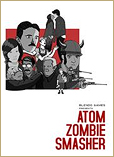

|
Atom Zombie Smasher
Blendo Games, PC/Mac/Linux
Blendo Games' four released titles--Gravity Bone, Air Forte, Flotilla, and now Atom Zombie Smasher--have almost nothing in common as gameplay experiences. That's impressive enough for any developer, and moreso for a one-man team. It's all the better that what they do share is creator Brendon Chung's just-quirky-enough low-fi aesthetic. They exist on a practically uninhabited band of the indie spectrum, a rough-edged surf-rock DIY enclave that eschews the rehashed retro or cloying Gondryesque preciousness that many less confident small-scale projects adopt.
So, Atom Zombie Smasher. It's got some tower defense in it--but like everything else Blendo puts out, it's utterly atypical. Zombie hordes governed by simple procedural routines creep into the edges of an urban district populated by panicking hordes you must protect with heavy ordnance and airlift to safety--as they are infected at exponentially rising rates. In between, you plot your next move in a war room shownig the scale of the zombie incursion. It's utterly simple to grasp but demonic in its rigor.
This is a game that expects you to fail many times before you eventually stave off genocide. And why not? Shouldn't apocalyptic events be apocalyptic? Why should there be any guarantees? Once you have run yourself through Atom Zombie Smasher's unyielding gauntlet and come out battle-hardened and numb, the victory will be so much sweeter.
Chris Remo
|


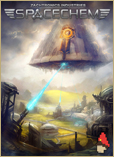

|
SpaceChem
Zachtronics Industries, PC/Mac/Linux/iPad
If you enjoy feeling intelligent, but you don't mind also admitting you're a total goddamned idiot, you should definitely record episodes of Idle Thumbs play SpaceChem.
Unlike most 2D puzzle games, SpaceChem isn't arbitrarily composed of colored blocks or gems or unicorns. Its premise is that you are building automated assembly lines that operate at the submolecular level to piece together given compounds out of individual atoms. The ways the atoms are allowed to bond are governed by the actual rules of physics.
SpaceChem consists of a series of challenges which slowly increase in difficulty as new mechanics are bolted on. From a gameplay standpoint, the science layer may as well be arbitrary, but it helps lend the whole affair a level of groundedness (despite the fictional context) that video games almost never bother attempting, and I found it even smooths the learning curve a bit--the mechanics feel true.
The real value here, though, comes from the sensation you experience when you have managed to set up multiple reactors working in clockwork concert to assemble, deassemble, and reassemble several different kinds of molecules and deliver your output to their waiting receptacles. So pleased was I with a few of my solutions (and there is never just one solution) that for the first time I took advantage of a game's publish-to-YouTube feature to show off my handiwork. Nobody cared, of course, but that didn't diminish my pride.
Chris Remo
|



|
|